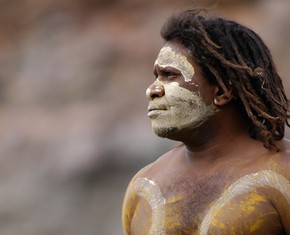The views expressed in our content reflect individual perspectives and do not represent the authoritative views of the Baha'i Faith.
In churches, ashrams, temples and mosques, you’ll often hear some version of the phrase “Let us pray, in God’s name.” What do you think that means?
How do we pray “in God’s name?” As a young boy, I wondered about things like that—so I asked a reference librarian. (They know the answers to just about everything.) Sure enough, she knew right where to find it, and showed me the explanation in an old book.
The book informed me that praying “in the name of the Lord” originally meant the prayer had to “be in accord with the divine Word.” As an example, the book pointed out that Christ had asked his disciples to pray in Jesus’ name, and promised them they would receive what they asked for.
Even as a child, I suspected that Christ’s promise wasn’t a literal one—but instead spoke to the symbolic truth of invoking a holy name.
Of course, as we all know, a name expresses the qualities of the one named—which means that praying in the name of God, or in the name of any of God’s prophets and messengers, calls on the beautiful spiritual qualities associated with that name.
So praying, fasting, supplicating and asking for something in God’s or Jesus’ or Buddha’s or Baha’u’llah’s name signifies forgetting our personal will in favor of the will of God, immersing our individual self and identity in the greater consciousness of the eternal, and building a mystical bond with something larger than ourselves.
Since the chief quality of God’s messengers and prophets is love, our prayers call on them for an increase in our capacity to love. Just as we ask the body to go without sustenance during the Baha’i Fast, prayer and meditation asks the Creator to grant us patience and detachment. Just as we train the mind by learning facts and theories and scientific truths, this process of fasting, prayer and meditation actually educates the soul. In The Brothers Karamazov, the Russian author Fyodor Dostoevsky wrote:
Be not forgetful of prayer. Every time you pray, if your prayer is sincere, there will be new feeling and new meaning in it, which will give you fresh courage, and you will understand that prayer is an education.
So the voluntary act of prayer, which educates us by temporarily allowing us to detach from the human ego, actually lets our souls transcend their station. When we adopt a consistent practice of fasting, prayer and meditation we seek the innermost heart of our being, and gradually gain access to a wider spiritual existence. Those spiritual disciplines open the door to a new world:
Prayer is the service of the heart. – The Talmud.
Prayer is the greatest of spells, the best healing of all spells… Amongst all the remedies this one is the healing one that heals with the Holy Word. – The Zend-Avesta.
Let the words of my mouth and the meditation of my heart be acceptable in thy sight, O Lord… – Psalms 19:14.
Seek aid with patience and prayer, though it is a hard thing save for the humble… – The Qur’an.
Reveal then Thyself, O Lord, by Thy merciful utterance and the mystery of Thy divine being, that the holy ecstasy of prayer may fill our souls—a prayer that shall rise above words and letters and transcend the murmur of syllables and sounds—that all things may be merged into nothingness before the revelation of Thy splendor. – Abdu’l-Baha, Baha’i Prayers, p. 69.
Baha’is fast during the daylight hours once a year for 19 days, and pray and meditate daily, using prayers actually revealed from Baha’u’llah, the prophet and founder of the Baha’i Faith; and from Abdu’l-Baha, its exemplar. Baha’is freely use their own prayers, as well. Baha’is don’t have churches, clergy or worship services, but do have informal devotional meetings which often include Baha’u’llah’s and Abdu’l-Baha’s prayers. Baha’i devotionals can also include prayers from the sacred writings of all the world’s great Faiths. But above all, the Baha’i teachings say that prayers should come from the heart and soul of every individual: “… the first principle of prayer is the turning of one’s heart to God.” – Abdu’l-Baha, Star of the West, Volume 3, p. 698.
The Baha’i teachings have prayers for most of the situations, tests and difficulties we human beings encounter in life. Baha’i prayers, whether read silently or aloud, chanted or sung or set to music, have the power to move the human heart and deeply influence the soul—especially during the time set aside each year for the Baha’i Fast.
Written in beautiful, metaphorical and symbolic language, the Baha’i prayers offer assurance, well-being and peace. Each of those prayers, no matter what their subject, asks God for assistance:
I pray Thee, O my Lord, by Thy hidden, Thy treasured Name, that calleth aloud in the kingdom of creation, and summoneth all peoples to the Tree beyond which there is no passing, the seat of transcendent glory, to rain down upon us, and upon Thy servants, the overflowing rain of Thy mercy, that it may cleanse us from the remembrance of all else but Thee, and draw us nigh unto the shores of the ocean of Thy grace. Ordain, O Lord, through Thy most exalted Pen, that which will immortalize our souls in the Realm of glory, will perpetuate our names in Thy Kingdom, and safeguard our lives in the treasuries of Thy protection and our bodies in the stronghold of Thy inviolable fastness. Powerful art Thou over all things, be they of the past or of the future. No God is there but Thee, the omnipotent Protector, the Self-Subsisting. – Baha’u’llah, Gleanings from the Writings of Baha’u’llah, p. 300.
















Comments
Sign in or create an account
Continue with Googleor